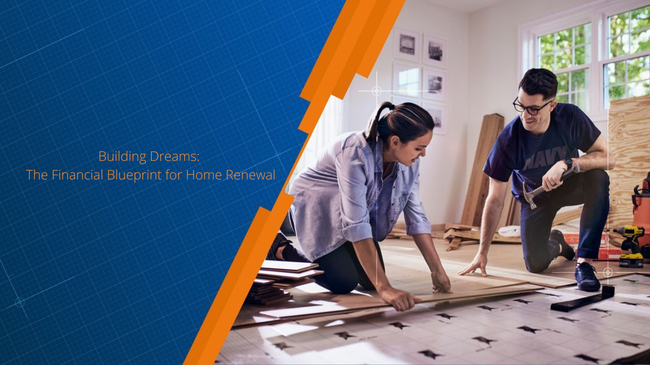Introduction
The home is often described as the heart's reflection, a tangible testament to the lives we've lived, the memories we've curated, and the dreams we harbor. It's where the walls reverberate with laughter, floors bear witness to first steps, and every nook and cranny narrates a tale. As time marches on, these very tales, in the form of wear and tear or evolving family needs, demand home improvements and repairs. Simultaneously, the idea of diving into a renovation project can be as exhilarating as it is daunting, primarily due to the finances involved. This is where credit, with its potential to transform homes and lives, becomes invaluable. In this article, we will explore the symbiotic relationship between homes and credit, delving deep into the possibilities they offer and the cautionary tales they whisper. Whether you're standing on the brink of a major renovation or merely contemplating future home endeavors, understanding the nuanced dance of leveraging credit for home enhancements is crucial.
Development
Historical Framework
Historically, homes were seen purely as dwelling places, constructed to offer shelter and security. The concept of 'home improvement' was limited to necessary repairs. As civilizations advanced, so did the notion of homes as a reflection of social status and personal tastes. In modern times, the dual idea of homes as a comfortable dwelling and a significant asset gave rise to the need for regular improvements and value appreciation. With this evolution, financial systems began offering dedicated solutions, like home equity loans, to facilitate these renovations.
When Should We Renovate the House?
Safety Concerns
Any structural weaknesses, faulty wiring, or plumbing issues should be addressed immediately.
To Increase Value
If you're considering selling in the near future, strategic improvements can significantly boost property value.
Modernization
Over time, design trends change. Renovating can keep your home up-to-date and increase its aesthetic appeal.
What We Should Do to Avoid Renovate?
Regular Maintenance
Addressing minor repairs promptly can prevent more significant issues in the long run.
Quality Over Quantity
Investing in quality materials and professional workmanship from the start can elongate the lifespan of your home elements.
Inspect Annually
Regular professional inspections, especially for areas like the roof, basement, or HVAC system, can preempt significant repairs.
Which are the Best Improvements and Repairs Loans?
Home Equity Line of Credit (HELOC)
A revolving credit line that lets homeowners borrow against their home's equity.
Home Equity Loans
A one-time lump sum loan against the home's equity, with a fixed interest rate.
Personal Loans
Unsecured loans that don't require home equity, suitable for smaller projects.
FHA 203(k) Loan
A government-backed loan designed specifically for home renovations.
What Should Have in Mind Before Getting the Loan?
Loan Purpose
Have a clear outline of what the borrowed money will be used for.
Repayment Capacity
Ensure you have a stable income source to manage monthly loan payments.
Interest Rates and Fees
Compare different loan products to get the best terms.
Future Home Value
Consider if the renovation will add to the property's value or if it's purely for personal satisfaction.
Patterns, Tendencies, and Future
Patterns
Homeowners have increasingly leaned towards loans specifically tailored for home improvements, given their tax benefits and favorable interest rates.
Tendencies
Green Renovations
Sustainable home improvements, such as solar panel installations, have gained traction.
Smart Homes
Upgrades now often include smart home features, integrating technology into living spaces.
Future
Virtual Renovation Advisors
With the rise of AI, homeowners might soon have virtual advisors guiding them on home improvements for maximum ROI.
Eco-Friendly Financing
Financial institutions may introduce loan products specifically for eco-friendly home upgrades.
Advices/Tips
Plan Ahead
Outline your project's scope and budget before seeking financing.
Hire Professionals
Proper execution can determine the longevity of your repairs/improvements.
Diversify Investments
Don't pour all your money into one renovation. Think about the overall home value and distribute funds accordingly.
Conclusion
The very fabric of a home is woven with dreams, aspirations, and stories of generations. As homeowners, the stewardship of this personal haven becomes our most cherished responsibility. In an era where opportunities and choices are abundant, leveraging credit for home improvements and repairs provides an avenue to not just enhance the structural and aesthetic appeal of our dwellings but also to fortify its foundation for years to come.
Yet, like all powerful tools, credit comes with its own set of challenges. Its allure should not overshadow the inherent responsibilities. Each decision to renovate or repair, to borrow or repay, creates ripples that affect our financial well-being, our daily comfort, and the legacy we leave for the next generation. We must approach these decisions with a blend of enthusiasm and prudence, ensuring that our dreams never compromise our future.
Moreover, as our world continues to evolve at a rapid pace, with technological advancements and shifting societal norms, the essence of 'home' and how we finance its metamorphosis will undeniably transform. It beckons us to stay informed, adaptable, and always prioritize the long-term vision of our home's role in our lives.
In the end, while homes echo our past, they also harbor our future. Through smart credit decisions and a keen understanding of its implications, we can ensure that this future is not just structurally sound but also a harmonious blend of memories, dreams, and enduring comfort.

